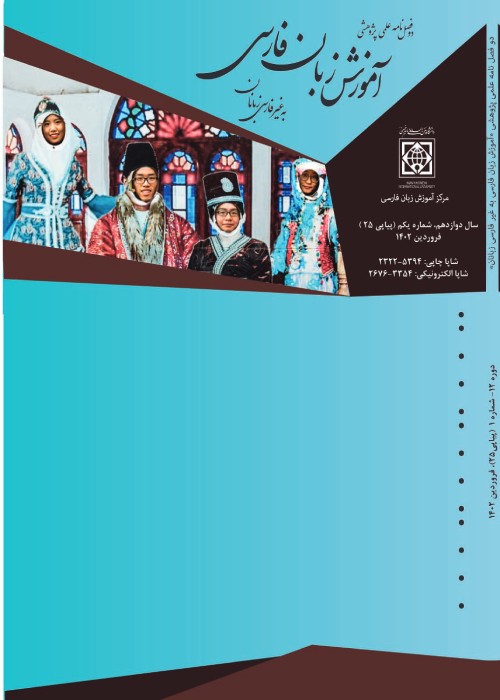The effect of language background and gender on non-Iranian Persian language learners’ motivation level during acquisition
L2 Motivational Self System (L2MSS) is the newest motivational model in the field of second language acquisition. One of the fundamental concepts of this system involves the motivational capacity of learner’s self-concepts while learning a new language. To investigate this motivational capacity, this study explored the motivation of a group of elementary and intermediate Persian language learners at the onset (before performing motivational tasks) and the end of the semester (after performing motivational tasks) with regard to their language background and gender. To this end, a group of 96 Arab and Chinese Persian language learners filled out the L2MSS questionnaire at the beginning and the end of the semester. The results of the study showed that, in each phase of data collection, L2MSS components (ideal, ought-to, and L2 learning selves) had varied manifestations. T-test results revealed that while a significant difference could be observed among elementary Persian learners’ scores in some of L2MSS components, such a significant difference could not be observed among intermediate Persian learners’ scores. Significant differences were observed between male and female learners’ ought-to selves in both the pretest and the posttest. Finally, conclusions and implications of the study and suggestions for further research were discussed. Expanded Abstract: Language learning is essentially a learner oriented procedure. As a result, learner variables and their individual differences play a significant role in learning a Second Language (L2). There are various learner variables which enhance the process of L2 learning. It goes without saying that motivation receives a high ranking among these contributing factors. L2 learners must be highly motivated to function successfully in their L2 learning. Throughout history, different models were put forward to explain the nature of an individual’s motivation for learning an L2. L2 Motivational Self System (L2MSS) is the latest motivational model proposed in the area of L2 learning (Dörnyei, 2009). One of the basic concepts of this model is the motivational capacity of learners’ self-concepts in the context of learning a new language. In L2MSS it is believed that the necessary motivation for learning a language is driven from the learners’ impetus to lessen the perceived discrepancy between his/her actual self and future L2 self. This model consists of three components, namely the ideal L2 self, the ought-to L2 self, and L2 learning experience self. The ideal L2 self is related to the specific aspects of one’s ideal self which represents one’s ambitions, hopes, and desires. On the other hand, the ought-to L2 self concerns those characteristics one ought to possess in order to avoid possible negative consequences, including one’s requirements, responsibilities, and expectations. While these two selves are considered general motivational constructs, the third component of the model, i.e. L2 learning experience, is concerned with situated motives essential to the immediate learning environment. Research on this model has shown that, among its constituents, L2 learning experience has had the most significant correlation with instructed L2 motivation. Present study was carried out to support the empirical findings on this model and further extend its validity to the realm of second languages other than English. Most of the previous research in this area has been undertaken among the learners with varied First Languages (L1) who are learning English all around the world. However, little has been done to validate this model based on the data obtained in learning a different L2 like Persian. Therefore, this study aimed at filling this research gap. In fact, it tried to examine the L2 motivation of a group of Persian learners at the onset (before performing motivational tasks) and the end of the course (after performing motivational tasks) with regard to their gender and language background. To this end, a group of 96 Arab and Chinese Persian learners were surveyed using L2MSS questionnaire. Each group was composed of 48 students (24 male and 24 female students). They were at elementary and intermediate levels of Persian proficiency (12 students at each level). These participants were chosen from a number of academic institutes which teach Persian specifically to foreign students. There were other students with diverse L1s whose data was put aside to cater for the specific variables of the study. All the data collection processes were carried out during participants’ regular English classes. The results of t-tests revealed different manifestations of L2MSS components in each cycle of data collection. Pretest scores, for example, showed significant differences among learners’ ideal L2 self and L2 learning experience at elementary level. However, no such differences were found among learners’ ought-to L2 self at either elementary level or among all these selves at intermediate level. This finding can be attributed to the fact that the more students proceed through the process of learning a new language the more stable concepts of selves are developed which are less liable to motivational fluctuations. Other findings revealed significant differences among male and female learners’ ought-to L2 self in pretest and posttest. All these differences were found at elementary level in which male participants reported higher ought-to scores in both phases of data collection. However, the same differences were not found among other components of L2MSS at both levels of language learning with regard to learners’ gender. All in all, it can be concluded that the two variables of this study, namely language background and gender, had different influences on different components of L2MSS. While learners’ language background affected their scores on ideal L2 self and L2 learning experience and not ought-to L2 self, the opposite scenario was observed for their gender. Finally, some implications and suggestions were driven from the findings of this study.
- حق عضویت دریافتی صرف حمایت از نشریات عضو و نگهداری، تکمیل و توسعه مگیران میشود.
- پرداخت حق اشتراک و دانلود مقالات اجازه بازنشر آن در سایر رسانههای چاپی و دیجیتال را به کاربر نمیدهد.


